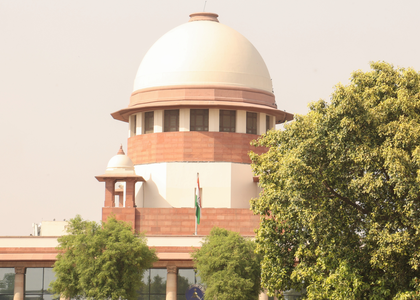‘Prima facie untenable’: SC frowns upon summons to advocates, matter referred to CJI
By IANS | Updated: June 25, 2025 16:48 IST2025-06-25T16:40:16+5:302025-06-25T16:48:48+5:30
New Delhi, June 25 The practice of probe agencies issuing summons to legal professionals for rendering their opinion ...

‘Prima facie untenable’: SC frowns upon summons to advocates, matter referred to CJI
New Delhi, June 25 The practice of probe agencies issuing summons to legal professionals for rendering their opinion to clients has come under the judicial scanner of the Supreme Court. A Bench of Justices K.V. Viswanathan and N.K. Singh prima facie opined that such summons were untenable in law and threatened the autonomy of the legal profession.
"Permitting investigating agencies/police to directly summon defence counsels/advocates who advise parties in a given case would seriously undermine autonomy of legal profession and would even constitute a direct threat to the independence of administration of justice", it remarked.
The Justice Viswanathan-led Bench was dealing with a plea of an advocate challenging the summons issued to him by the Gujarat Police though he was neither an accused nor a material witness to the facts of the FIR or the agreement in dispute.
Granting interim relief to the petitioner, the apex court ordered that no coercive action will be taken against him in furtherance of the summons issued by the Assistant Police Commissioner.
It also framed two questions for consideration of the top court and directed that the matter be placed for further directions before the Chief Justice of India (CJI).
First, when an individual is associated with a case only as a lawyer advising the party, should the investigating agency/police directly summon the lawyer, and second, assuming the prosecution has a case that the role of individual is not merely of a lawyer, but something more, even then, should the investigating agency/police be permitted to directly summon or should a judicial oversight be prescribed for such an exceptional situation.
Emphasising that the efficacy of the administration of justice was at stake, the Supreme Court called for the assistance of Attorney General of India R Venkataramani, Solicitor General Tushar Mehta, the Bar Council of India, Supreme Court Bar Association (SCBA) and Supreme Court Advocate-on-Record Association in the matter.
The Special Leave Petition (SLP) filed by advocate Ashwinkumar Govindbhai Prajapati challenged the refusal of the Gujarat High Court to quash the notice issued to him under Section 179 of BNSS (Bharatiya Nagarik Suraksha Sanhita) in relation to an FIR registered under Section 296(b) and 351(3) of the Bharatiya Nyaya Sanita, 2023, the Gujarat Money Lenders Act, 2011 and the Scheduled Castes and the Scheduled Tribes (Prevention of Atrocities) Act, 1989.
“The petitioner was neither an accused nor a material witness to the facts of the FIR or the agreement but was being compelled solely due to his professional role as an advocate, which is impermissible under the law,” contended the SLP filed through advocate Siddhant Sharma.
It added that by upholding the notice, the Gujarat High Court has created a “dangerous precedent” that could be used to intimidate advocates representing contentious clients or causes, thereby undermining the criminal justice system and contravening public interest.
Under Section 132 of the Bhartiya Sakshya Adhiniyam, 2023, communications between an advocate and their client are privileged and cannot be disclosed.
Also, advocates are bound by professional duty to maintain the confidentiality of client communications and advice provided during proceedings.
Recently, summons were issued by the ED to senior advocates Arvind Datar and Pratap Venugopal but were subsequently withdrawn by the federal anti-money laundering agency.
In a letter addressed to CJI B.R. Gavai, SCAORA President Vipin Nair had urged the Supreme Court to take suo motu cognisance of the matter and examine the legality and propriety of such summons issued to legal professionals for opinions rendered in good faith.
The Bar body requested the top court to safeguard the constitutional and professional protections afforded to advocates and lay down appropriate guidelines to prevent any further erosion of the lawyer-client privilege.
Disclaimer: This post has been auto-published from an agency feed without any modifications to the text and has not been reviewed by an editor
Open in app